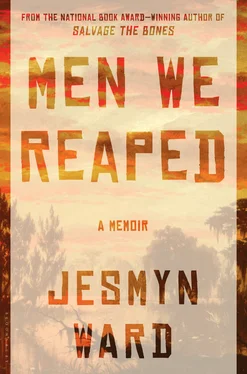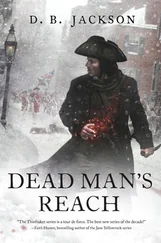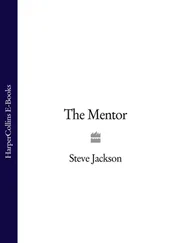Rog talked about change, about returning to California, with others, too. It was all he could think of then, and I imagined the pines and the thick air felt like the walls of an invisible room to him, closed on all sides. Perhaps this made him use more, because like many people, Rog medicated with drugs and alcohol. His habit became more evident. He lost weight, became even more wiry, even more lean, his smile, slight when it shone, dimmer in his face. His cousin Bebe said that leaving was all he talked about one summer day, leaving Mississippi to return to California. He missed his job; he missed the freedom of the different, the new. He told her, “Cuz, you know, it’s a better place for me out there. I can make a better way.” He turned his bottle up. “I’m ready to change, ready to go,” he said. “I’ll be straight out there, but here …” And as he spoke, a boy from the neighborhood who was notorious for using drugs, cocaine, heroin, marijuana, drove up in his Cutlass. Parked. Walked up and said: “What’s up?”
Some knew that Rog was snorting cocaine, and others didn’t. In Mississippi, cocaine was a party drug in the late seventies and early to mid-eighties. People in my parents’ generation snorted it, or they smoked it with weed. They did it secretly, casually. For some the habit stuck, and for others it didn’t. And then came crack, a terrible development for those with a coke habit: it was a cheaper, more addictive high. Those who couldn’t stop changed from partiers to addicts. They stole from their families, from strangers, to support their habit.
There is a story that I like to tell about the close-knit nature of DeLisle and the Black enclave of Pass Christian. When you wake up and find that, say, your car stereo is missing from your car, you’re pissed off about it. You call your cousins and tell them about it, mention it to a few friends. You suspect who may have stolen it. By noon, one of your cousins or friends has called you with news, told you that someone saw someone else walking through the woods or loping along the street with your stuff under their arm. That afternoon, you show up at the thief’s house, which is small, a little worn, but neat. You get loud. You demand your radio back. They are shamefaced as you berate them, and they may even curse you back or smile nervously, but they will return what they stole. This is how stealing was handled when I was growing up through the eighties and the beginning of the crack epidemic in the nineties. This is not what happens today. By the time you get to the thief’s house in the afternoon, a house that has no electricity and a rotting floor, they will have pawned your radio, and they will have smoked it, and their eyes, jittery in the skull, will slide past you to the red dirt ground, to the sky, to the trees waving overhead, and they will lie until you give up to follow the trail elsewhere, until you leave.
There is a stigma associated with coke among the young in DeLisle and Pass Christian because it is too close a cousin to crack. Kids will take shots of white strong liquor, they will smoke weed wrapped in thick blunts, they will even take Ecstasy or prescription pain pills, but they will not casually pull out an eight-ball of coke and push it across the table at a house party. Why? Because the specter of the cousin or the uncle or aunt or the mother or father who couldn’t stop partying, whose teeth are burned brown from the pipe, sits next to them at that table. Young people who do coke lie about it, attempt to hide it, and often fight it. Rog hid it and fought it.
Some of my relatives, on my mother’s side and my father’s, have abused crack, on and off, for years. I can’t fault them for it , Charine always says when we talk about it, that’s just their high that they like. Fuck it. It helps them cope . And then: They’re grown . I understand her now, but I did not understand her point in the summer of 2004. Did not see the way liquor had been my drug for years. Was not connecting the relief I felt when I drank with the drugs others were using, or even thinking that it could be the same for my relatives, the same for my siblings, or the same for Rog. I knew that I lived in a place where hope and a sense of possibility were as ephemeral as morning fog, but I did not see the despair at the heart of our drug use.
The last time that I remember seeing Rog in the summer of 2004 was at a gas station. I don’t remember whom I was with, but we’d stopped to get gas at the BP on the beach in Pass Christian, the BP that would disappear a year later when Hurricane Katrina swept in and decimated the coastline. The pumps buzzed, and I jumped out of the car when I saw Rog lope by with his beer, his face long, his mouth closed, no teeth this time. He was so skinny. His eyes were closed to slits like he was smiling, but he was not.
“What up, Rog?” I said.
“What’s up?”
He hugged me, black T-shirt loose on his frame. His shoulders barely touched mine. He was already pulling away, already out of the polite embrace. He was already back in the car with two men from the hood. He was already swallowed by the black reach of the highway. The wind from the Gulf stuttered in, blew sand lazily across the parking lot, across my feet, and Rog disappeared into the dim, tree-tunneled streets of Pass Christian, like an animal down its secret hole.
Years later, Charine told me she tried to visit Rog after he died but before he was found. In other words, she visited him when she thought he was alive. She and her friends banged on the door of the dark, shuttered house, not knowing that Rog was already dead inside. His sister Rhea would find him two days later. They called his name: “Rog!” They said, “His ass is probably passed out in there. Rog!” Louder. “Come open the door!”
Now, Charine says, knowing how he lay behind that door breaks something inside of her.
Years later, Nerissa told me about Rog’s visit with her in February 2004. This would have been when Rog and our cousins were doing too much coke because C. J. had just died. This would have been when they were raw with love, with losing. This would have been when Rog passed out, when our cousin was afraid he wasn’t breathing, when he carried Rog into Nerissa’s bathroom and put him in the tub, ran the water cold, hoping for a miracle, for the flame not to go out. My cousin cried. He yelled, “Don’t do this to me!” Beat Rog on the chest. “Not you!” Yelled at Rog, “Not again!” And then Rog drew a breath and opened his eyes.
Rog did cocaine, and then he took a few Lortabs on the night of June 3, 2004. For once, there was no party, no casual gathering of friends at his mother’s house. Then Rog, the boy with the beautiful smile and the long face, lay back in his bed, feeling high and low, feeling everything and nothing, all at once. Perhaps he was thinking he should be somewhere else, maybe out under the palm trees in California, walking along Venice Beach with his cousins, smelling incense that you could almost mistake for weed. Maybe he thought of the sky over the Pacific Ocean, the water stretching away to meet the clouds and disappear over the horizon, the way it seemed to go on forever. Maybe he was thinking of his family, of his mama’s return from working offshore in the Gulf of Mexico on an oil rig. Maybe he was thinking about the air conditioner, how good it was to lie in a cool dark bed at home, to be. Maybe he wasn’t thinking about any of these things, but I like to imagine that he was thinking about all of them when the seed of the bad heart that had killed his father sent out roots and bloomed violently in Rog’s chest. Sometime that night Rog died of a heart attack.
I was at my mother’s house, alone, when my brother’s last girlfriend, Tasha, called and told me Rog had died.
Читать дальше












